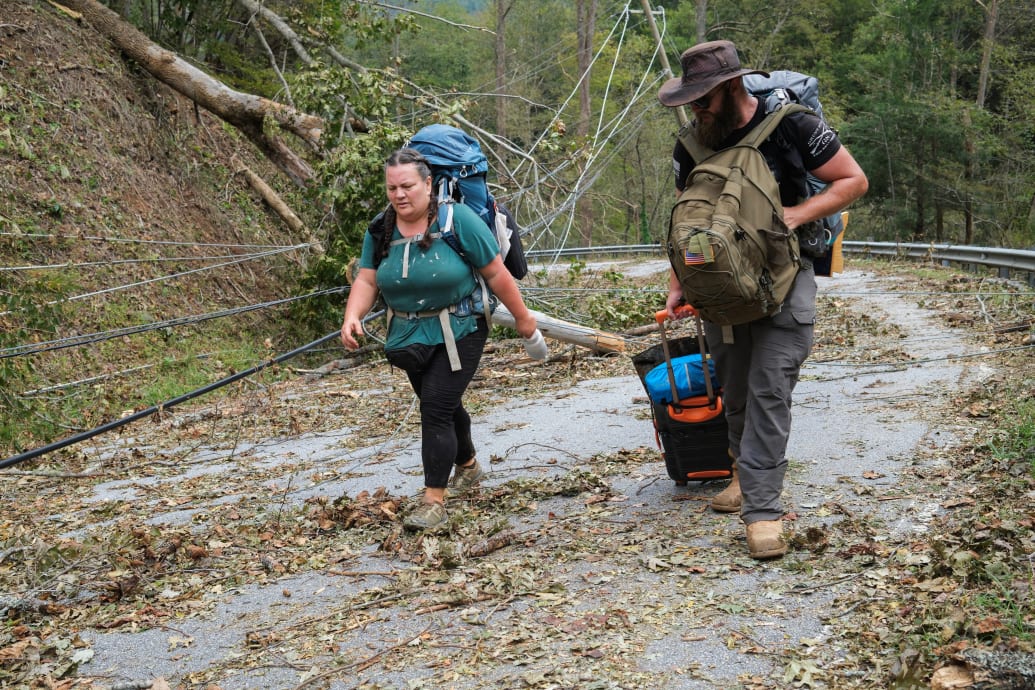An area touted as a “climate haven” that’d be safe from the adverse effects of global warming is among the most devastated by Hurricane Helene.
Real estate experts like Jesse Keenan, of Tulane University, said in 2022 that Asheville, North Carolina, was the landing spot for scores of Americans moving in hopes of living somewhere that’d be climate-proof.
Now, however, the mountain city of 94,000 is the site of “biblical devastation,” said one local emergency services official. That comes after Helene made landfall in Florida and quickly moved north, inciting flash floods that wiped some tiny Carolina city’s entire downtowns—like that of nearby Chimney Rock—off the map.
More than a hundred deaths have been attributed to Helene across six states, with officials warning the toll will likely rise. Rescue efforts in and around Asheville have lagged as highways surrounding the city were washed away and cell service remains mostly unavailable.
Hundreds in western North Carolina remain unaccounted for. Tourists in mountain rentals were among the trapped and panicked, and hundreds—if not thousands—of residents saw their homes inundated or washed away by flood waters. Being so far from the coast, it appeared few locals evacuated.

Large portions of the area’s major highways and local roads were washed away by flash floods.
Getty Images
It’s a worst-case scenario that didn’t previously seem possible to most in the Carolinas. Asheville’s River Arts District is inundated, clips show. The state has ordered that all roads in western North Carolina be closed, with only emergency vehicles being legally permitted to attempt to traverse them. Rescue missions are being carried out by private citizens with helicopters, and those with loved ones trapped in the area have posted heart-breaking pleas for any information about their well-being.
“It’s been an incredibly apocalyptic weekend for all of us here,” the Asheville resident Gregory Harrison told Fox News. “Almost no gas. There is almost no cell service. There’s limited power. There is limited food. There are people who are trying to find potable water to feed their families, to have water for their kids.”
The true cost of Helene’s destruction won’t be known for months, but experts at Moody’s Analytics expect it will cost between $20 billion to $34 billion to rebuild. AccuWeather has an even more eye-popping estimate, with an estimated cost between $145 billion and $160 billion.
The destruction calls into question the expertise of real estate gurus who sold Asheville as a place to escape extreme weather events. Asheville ranked No. 2 in the U.S. earlier this year for the highest planned move-in vs. move-out ratio, but it’s not clear how many of those moving did so to escape potential climate disasters.
Causeartist, which describes itself as a source for “impact economy news,” described Asheville as a “desirable location” that’s “less vulnerable” to extreme weather in 2022.
“Nestled in the Blue Ridge Mountains, Asheville is less vulnerable to sea-level rise and extreme weather events,” the website said. “Its mild climate, rich cultural scene, and growing economy make it a desirable location.”

Some residents who lost everything in North Carolina have resorted to evacuating by foot with many roads now unusable.
Marco Bello/Reuters
That was far from the only instance where Asheville was touted as a place safe from global warming. The city’s local paper published an article last summer detailing why Asheville came in third on a list of the top 12 U.S. cities most likely to receive a population boon from climate migration.
Other headlines published in recent years include: Come Hell Or High Water, Asheville Is Climate ‘Winner’; Western North Carolina, Climate Refuge?; and Climate haven: More people moving to Asheville to escape more severe climate change.
We’ll never know for certain if such discourse provided a false sense of security for western Carolina’s residents, but some have already began using this disaster as a warning to those who live in other so-called “climate havens” that a climate catastrophe can occur anywhere.




![Tyson Foods Plant [Photo: Food Manufacturing]](https://southarkansassun.com/wp-content/uploads/2023/08/iStock_1185520857__1_.5e441daa51cca-600x337.jpg)








![Silverado Senior Living Management Inc. [Photo: Los Angeles Times]](https://southarkansassun.com/wp-content/uploads/2023/10/download-6-4-600x337.jpg)

![China's Wuhan Institute of Virology [Photo: Nature]](https://southarkansassun.com/wp-content/uploads/2023/09/d41586-021-01529-3_19239608-600x337.jpg)















